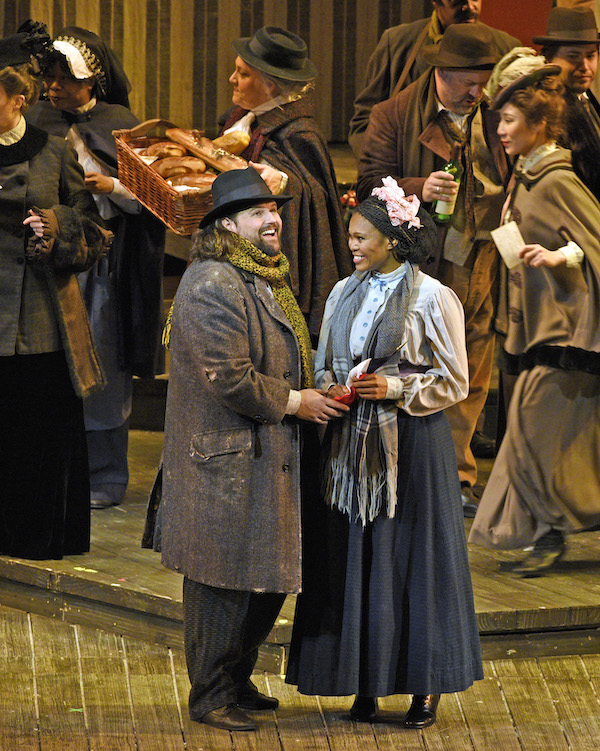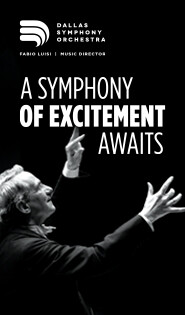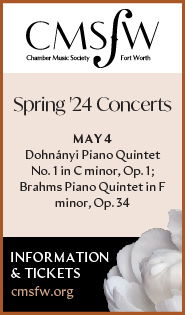Staging oddities apart, Dallas Opera’s “Boheme” retains its romantic warmth and dramatic impact

Pumeza Matshikiza and Jean-François Borras in Puccini’s “La Boheme” at Dallas Opera. Photo: Karen Almond
Dallas Opera presented a solid, dramatically appealing production of Puccini’s La boheme Friday night at Winspear Opera House. While a few questionable staging choices and vocal mishaps intruded, the enduring power of the piece emerged unscathed.
Much of the credit for the overall success of the evening belongs to conductor Giuliano Carella, whose sense of timing and phrasing created the relentless forward motion that is one of the greatest aspects of this score. As with all of Puccini’s operas, the tunes are the most obvious and appealing element in Boheme; in Carella’s reading, the foundation beneath the pretty melodies, including the skillful counterpoint and the beautifully crafted harmonies and orchestration, were deftly managed, reminding one that this immensely popular work is also a work of great genius.
South African soprano Pumeza Matshikiza made her American debut Friday night as Mimi, with a distinctively textured voice and tremendous vocal power, unfortunately marred by a few moments of strain. Tenor Jean-François Borras as Rodolfo matched her with a substantial and beautiful tone, but with similar moments of technical insecurity. A production of La boheme can stand or fall on the closing triptych of two arias and the duet that close Act I; Borras glided through “Che gelida manina,” and Matshikiza soared sweetly in “Mi chiamano Mimì,” but both failed to deliver the difficult pianissimo singing that closes the scene.
Soprano Sara Gartland was unfailingly superb as a lean, athletically seductive Musetta, bringing a firm, unwavering quality to her famous waltz in Act II. Baritone Anthony Clark Evans responded with a smoothly attractive vocal tone as Marcello.
The comprimario roles were uniformly excellent as well; baritone Will Liverman delivered his brief Act I narrative with humor and lively energy, and bass-baritone Nicholas Brownlee briefly stole the spotlight with a touching and vocally rich rendition of “Vecchia zimarra” in Act IV. Veteran bass Samuel Ramey was onstage for the roles of Benoit and Alcindoro, acting and singing the part of two outsmarted old gents with the finesse and expertise, and clearly enjoying himself immensely in both characters.
La boheme gives ample opportunity for designers and directors to put their own stamp on the work. Erhard Rom’s sets, originally designed for Opera Theatre of Saint Louis in 2001, use projected photographic images of nineteenth-century Paris effectively to create a charmingly slummy aura. The crowded Café Momus scene was brilliantly lit and colorful, while the chilly winter scenery for Act III created a perfect sense of depth and darkness on the edge of a great city.
Depending on one’s viewpoint, the visual trope of photographs of cast members was either a heavy-handed gimmick or a masterstroke to emphasize the work’s inherent emotionalism; either way, it was, in its final manifestation at the end of the show, a guaranteed hankie-grabber.
Costumes by the late Peter J. Hall from the Dallas Opera’s warehouse clearly delineated the characters, from Mimi’s impoverished drabness to a shock of bright colors for Musetta.
Israeli-born Tomer Zvulun, who is currently general and artistic director of Atlanta Opera, served as stage director for the production; the cast moved with unfailingly busy emotion, even in the slowly unwinding final scene. At times, Zvulun tended to unnecessarily crowd the stage with conflicting focal points—for instance, introducing a distracting drunk passing out at center stage in the Café Momus scene. For the close of Act III, in another action unauthorized in the score or libretto, Zvulun had Musetta and Marcello reconcile visually, a highly questionable strategy that adds nothing to the characterization or plot development, and contradicts the content of the scene and direction of the narrative.
One might well argue with a few other details along the way, both vocally and in the staging. But the thrilling, heart-wrenching moments and romantic sweep that have earned La boheme its perch near the top of the all-time operatic hit parade are largely in place for this production.
Puccini’s La boheme runs through March 31. dallasopera.org


